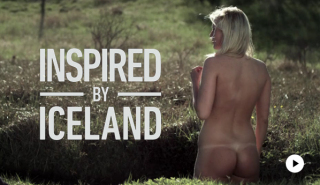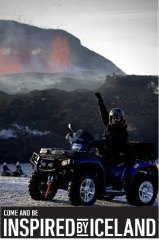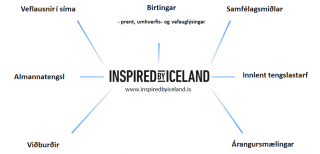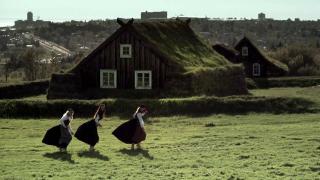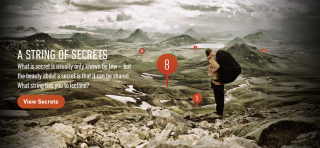After being hailed as the world’s radical wunderkind for a few years, Iceland left observers perplexed when the parties evidently responsible for its failed neoliberal experiment were voted back in 2013. Who or what runs this shop, really?
You “want to move outside the herd and be independent” because you are “different from the ‘ordinary’ tourist.” You “have above average education” and you “have above average income,” says the Icelandic Tourist Industry Association’s report from last year, defining their target group, ‘the enlightened tourist.’ And boy, are you targeted.
Since 2010, the local population has been thoroughly informed about the importance of proper social media utilisation. In its 2012 annual report, the national branding bureau known as Promote Iceland states that the general public is being ‘harvested’ for this purpose. That year, Promote Iceland also ‘assisted’ some 600 foreign journalists in organising their visits to the country. Journalists and bloggers coming specifically for events sponsored by Promote Iceland wrote 1,400 articles, including pieces in The New York Times, Huffington Post, The Guardian and so on. Sponsored events included music festivals, food festivals, dance, theatre and design festivals. And a marathon.
Meanwhile, a few Hollywood film productions were funded directly through Iceland’s state budget, using Tom Cruise, Ben Stiller and Ridley Scott and their fine productions for the promotion of Icelandic landscapes. If no such subtle methods of nation-branding get to you, of course some good old advertising is also involved.
Bad breath, meet white teeth
In late 2007, in response to what was locally perceived as an image-crisis, mainly that some foreigners were sceptical about the growth of Icelandic banks, the Prime Ministry formed a committee on the Image of Iceland. A few months later, in April 2008, the committee published its findings in a report. The report’s main proposal was that various institutes dealing with exports, culture and diplomacy, should be put under the control of one bureau to unify broadcast messages. One correspondent quoted in the report explained that we must “walk in unison and speak with one voice.” The report suggested that institute be called Promote Iceland. Then came October, the boom went bust, and mass protests were followed by a change of government—making the need for image-management plain for all to see. As stated in the report, “future orientation must be long-term, and must not change along with changes in government every few years and the nation must agree on it.”
In 2010, the marketers faced a unique challenge, an unforeseen national branding emergency, as Eyjafjallajökull erupted, disrupting the flight schedules of millions. As if stories of crooked bankers, political incompetence and violent riots were not enough, travellers all over now cursed Iceland for its geo-historically bad breath. Thank god work on Promote Iceland was already well under way. The necessary legislation was hastened and before the eruption was over, Parliament passed the Promote Iceland Law (38-2010). This sputnik institute whipped up the social media-based campaign ‘Inspired by Iceland’ and before anyone knew how to pronounce Eyjafjallajökull, Icelanders appeared on YouTube, dancing to Emiliana Torrini’s “Jungle Drum” in the seemingly eternal sunshine of spotless fun. Post the video, spread the message, officials urged their compatriots: show people everything is alright, invite friends over. And tourism went up. Solid nation-branding, Promote Iceland’s unified message was obviously a winner.
After being hailed as the world’s radical wunderkind for a few years, Iceland left observers perplexed when the parties evidently responsible for its failed neoliberal experiment were voted back in 2013. The right-wing coalition government just published its first annual budget proposals, for 2014. Schools, hospitals, welfare, culture, arts and sciences face the world’s most terrifying euphemism: austerity. One single item in the whole budget, however, is explicitly declared ‘exempt from budget cuts’: Promote Iceland. The law passed through Alþingi without debate in 2010 established an institute funded by taxes, but run by a board majority appointed by the Confederation of Icelandic Employers (CIE). Yes, there is such a thing. And yes, it is what it proclaims to be: the national capitalists’ union. One lobby to rule them all. The confederation negotiates salaries nation-wide. It directly funds research in Bifröst University’s business department. It does all sorts of clever things to secure its members’ interests. And now they have this new central bureau. Obviously, Promote Iceland is not a propaganda ministry. Ministers are elected officials; their policies are debated in public and subject to change. Promote Iceland is something much handier.
The value of our values
Apparently some U.S. schools teach, as fact, that ‘the Vikings’ gave Iceland its name to keep strangers away from the place, using the even more dishonest name ‘Greenland’ as bait to misdirect them towards a glacier. This remains speculative. What is true is that local attitudes towards foreigners have long been selective. In 1936, Iceland chose not to join the League of Nations because the members’ countries condemned Mussolini’s Italy for using chemical weapons against the population of Abyssinia. At the time, Italy imported fish from Iceland. After Iceland’s polite gesture, Mussolini showed his appreciation by signing an import agreement with Iceland in his own hand. Another example of Iceland’s selective foreign policy is the country’s request that the US armed forces would not send any black soldiers to its Keflavík military base. The US agreed until the 1970s when the policy became a scandal in American newspapers. In an early display of intuition for nation-branding, Icelandic officials responded kindly: Send a few so you can call it mixed. The soldiers were then kept under curfew, only allowed to Reykjavík on Wednesdays, during which, idiosyncratically, the selling and consumption of alcohol was forbidden.
Nowadays, the most striking display of Iceland’s implicitly selective foreigners policy is its preference not to grant refugees asylum. The 2009–2010 record of thirteen individual refugees receiving full asylum in two years was set by a left-wing government under heavy scrutiny from activist groups. Otherwise the number is mostly zero. The presence of Roma communities is not debated in Iceland. If any arrive at all, the media declare them a threat before the police swiftly throw them out. And so on. Those excluded are obviously not just any foreigners. They are vulnerable, poor people. You are probably somewhat better off and you are very welcome. As Prime Minister Sigmundur Davíð phrased it last September, addressing financiers in London: “We want you and your money in Iceland!”
The original 2008 report on the Image of Iceland showed awareness that socially oriented projects can make useful marketing ploys. The report acknowledged the value of artists: “Positive success stories are considered one of the most successful marketing tools today. […] One option is constructing stories of the success of Icelandic companies and individuals in all fields of enterprise, culture, arts and business. It is necessary to use poets, writers, photographers and sound engineers to deliver these stories convincingly.” It also recognised the value of communal ties, suggesting that “key people from certain market zones should be invited to visit Iceland once a year.” It showed appreciation of the value of education and cultural heritage, proposing special projects like, “The Saga-nation exterminates illiteracy, a global effort to teach reading. Each year the nation provides financial and educational support to teach as many people to read as the number of the nation’s members. […] Thus the heritage of the sagas can be intertwined with the global problem of illiteracy, emphasizing the nation’s high levels of education and enlightenment.” It valued peace: “Iceland – the World Peace Camp: Iceland will be leading in connecting children and youth from all over the world – especially from conflict zones – who will come to Iceland for a week to participate in a peace camp, subsequently becoming peace ambassadors of Iceland.” Oh, and: “Iceland will be the world’s first country to offer all its subjects [!] to invest in businesses in Africa.” And, sadly, cynically, ruthlessly, so on.
This broadcast will not be revolutionised
The long-term challenge faced by Promote Iceland was not Eyjafjallajökull’s eruption but the financial crisis and its aftermath—the ‘kitchenware revolution.’ In 2009, Icelanders voted left. It made good spin material. The recently elected President Obama signified change in people’s mind. Through a sustained effort, Iceland broadcast a clear message about radical change. And so you heard about Iceland’s new crowd-sourced constitution, the prosecution of evil bankers and the president who refused to let the people pay the crazy bankers’ bills. These fine stories are not true, as in what actually happened, because that’s not what they are for. These are convincing success-stories, vital elements of any ambitious nation-branding project.
The truth is that after a grand democratic theatre performance, involving the country’s whole population, the new constitution was, with somewhat less fanfare, simply cancelled. The president made his operatic gestures, swiping away Iceland’s burden of reimbursing German and Dutch savings accounts, while securing his own re-election. Most of the banks’ staggering debts were nonetheless absorbed through the devaluation of Iceland’s currency, leaving wages, pensions and savings worth only half of what they were before. They remain so. Export industries are booming, while wages stay far below the EU average. Every working person who stays in Iceland pays the infamous bankers’ debts. And most stay. Most of them owe their homes to a bank. Most would sell at a loss. Those who could turn a profit cannot bring that profit out of Iceland, due to currency restrictions. Yes, this is somewhat Berlin Wall-ish. Luckily, however, being an island, Iceland needs no such eyesore. Cheap labour makes Iceland an increasingly popular tourist destination, they stay and pay their dues serving foreign visitors—enlightened tourists like you.
“Iceland got back on its feet and is now thriving” because that is what you wanted to hear. If there is anything you like more than a winner, it is a sympathetic, quirky, leftist kind of winner. Promote Iceland’s original 2010 campaign got Icelanders dancing in front of cameras all around the country, to soothe you, show that we’re all right and you will be safe here. The 2011 ‘invite a tourist home’ campaign showed a cosy little place where the minister of finance will give you a foot massage. The most recent effort is the ‘Share Your Iceland Secret’ campaign, encouraging locals to reveal their ‘secret places’ to you, hidden gems of city life or nature, to be crowd-sourced into an accessible app. Meanwhile, one by one, Reykjavík concert venues, parks and such disappear to make way for hotels. The whole post-lapsic process, however, does not feel like Naomi Klein’s shock doctrine tactics. Partly due to IMF’s plan to ease the country in. Partly due to four years of some actual socialist policies. Partly because so far, foreign investors are neither eager to buy the country’s natural resources nor infrastructure. And to a large extent because of Promote Iceland’s unified message, our success-story. Currently, exploitation remains focused on harvesting human resources, utilising people’s spare-time and private lives for the greater good, formerly known as GDP. Polls reveal the locals to be happier now than before 2008. Consuming less alcohol, less sugar and less tobacco, they tend more to what really matters. You.
Live happily ever after!
Summarising this article’s hypothesis runs the risk of caricature but let’s do it anyway: In Iceland, the logic of marketing and branding has been permanently institutionalised to minimalise the damage done by democratic processes, against which it currently has the upper hand. Meaning: Promote Iceland runs this shop. Iceland is a billboard. Some still hope that this is a case of double-bluff: that underneath the presently exposed layer of all-encompassing business logic runs another current, the cunning logic of history, a wisdom revealed through the ballot box.
Such a hypothesis would claim that the current coalition was tricked into power, maneuvered into overbidding the all-too compromising left-wing parties in a blackjack game of socialist promises: we will annul your private debts, PM Sigmundur Davíð promised, because they are unfair. We will fight the evil venture-capitalists and justice will prevail. If the coalition runs out of revolutionary steam or fails to deliver on its socialism, this hypothetical hypothesis would hold; they will be ousted once more. The third option is that the world, including Iceland, is an obscure and chaotic place and there is no underlying logic. And then there is the Prime Minister’s hypothesis. In the opening speech of the current parliamentary session, Sigmundur stated that, so long as the general public works in confident unison towards a shared vision of the future, so long as we do not let ourselves be influenced by ‘extremist ideologues,’ aiming at ‘disintegration and subversion,’ this country can be an exemplar, where “a cohesive and happy people live in safety to the end of their days.” For the sake of brevity, however, this article will make do with one speculative hypothesis at a time.
